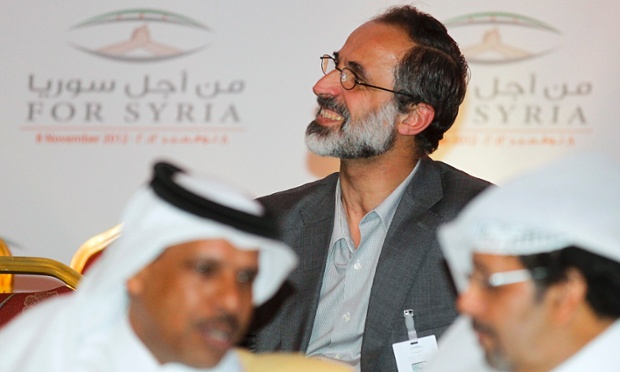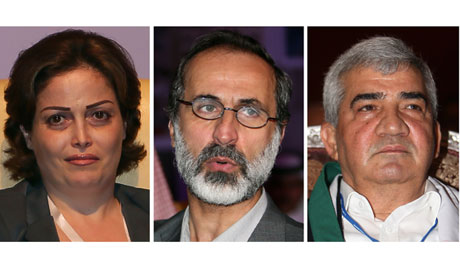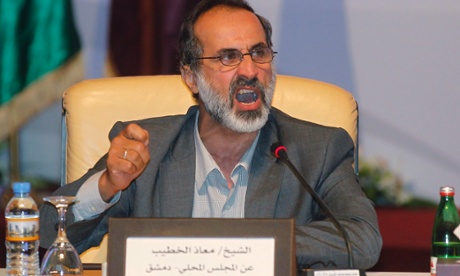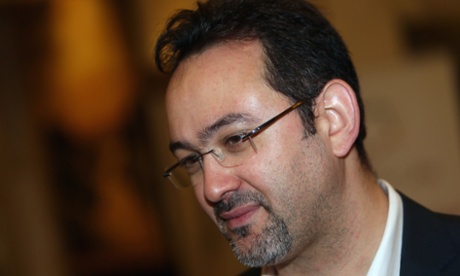Syria conflict: UK to host talks on further help for rebels - live updates
LIVE• Talks in London after Cameron suggested arming rebels
• Former cleric Moaz al-Khatib new leader of opposition
• Syrian jets bomb rebel-controlled border town
• Israel warning over Golan Heights shelling

Matthew Weaver
guardian.co.uk,

Former imam Moaz al-Khatib was elected as the first leader of a new Syrian opposition umbrella group. The coalition was formed in Doha after a week of bickering and pressure from the US and Gulf countries. Photograph: Mohammed Dabbous/Reuters
Khatib is a 'unifying figure'
 New Syrian opposition leadership team Suhair Atassi, Ahmed Moaz al-Khatib and Riad Seif Photograph: Karim Jaafar/AFP/Getty Images
New Syrian opposition leadership team Suhair Atassi, Ahmed Moaz al-Khatib and Riad Seif Photograph: Karim Jaafar/AFP/Getty ImagesSyria’s new opposition leader is a unifying figure who should not be confused with a traditional Sunni cleric despite his background as an imam, according to the Syrian writer and broadcaster Rana Kabbani.
Kabbani, who has known Ahmed Moaz al-Khatib for 20 years, said his election made her optimistic about Syria for the first time in months.
She said Khatib and his deputies Suhair Atassi and Riad Seif, the driving force behind the new coalition, were figures of “real stature”.
He comes from a venerable family known for charitable work and their call for peace between Syrian groups. He comes at a time when this is needed more than ever. Syria is in ruins. The man is someone who all parties, whatever their ideological background, ethnicities or feelings about the former regime, will be able get behind. He is a man of real moral qualities.
He understands that the extraordinary quality of Syria is that it is a country with many religions, many languages [and] many ethnicities.
Asked how a former Sunni cleric can unite Syria’s disparate sects, Kabbani said:
He is not a conventional imam in any sense of the word. He is representative of a mosque [The Umayyad in Damascus] and a city which were themselves very layered. The Umayyad mosque had been a pagan temple, and then a Greek one, then a Roman one, then a Christian church, and then became a mosque. So this is a place where all Syria worships and thinks of as its centre.
Khatib has history in grassroots activism if not national politics, Kabbani said. He and his friends and family have been arrested many times.
He comes from the post-Hama generation [a reference to the massacre of Muslim Brotherhood opposition in 1982]. Those men and women who knew exactly what the Assads were like and knew what was required to change Syria.
I for once, in many many months, suddenly feel optimistic about the future ... because he’s a unifying figure and not a divisive one. He is not what he seems. He is not a traditional Islamist. He is not the traditional Sunni. He is someone who has all of Syria at heart.
He has a long history of good works and he was able to function in a country that would have liked to see him killed many years ago. That is an indication of his supple nature and his real courage and vigilance.
He has a hell of a job ahead of him. And I wish him great luck, but I don’t think it is an impossible job.
She claimed those in the Syrian National Council who refused to get behind Khatib will “go down with Assad”.
Ahmed Moaz al-Khatib, the 52-year-old former cleric elected leader of the Syrian opposition, emerges as something of a renaissance man, according to his CV.
He has had stints as an imam, activist, lecturer and he is a trained geologist who worked for an oil company.
A biography of the new leader, circulated by opposition member Mulham al-Jundi, said Khatib was arrested four times for supporting the Syrian uprising before leaving the country.
He was mostly recently arrested in April, it says.
In his opening speech as leader Khatib called on all sects in Syria to unite. "We demand freedom for every Sunni, Alawi, Ismaili (Shia), Christian, Druze, Assyrian ... and rights for all parts of the harmonious Syrian people," he said.
Khatib, who comes from a family of Islamic scholars, has a reputation for rejecting sectarianism, according to the biography. He is a former chairman of the Islamic Modernisation Organisation.
He was an imam at the Umayyad mosque in Damascus 20 years ago. But he also worked for six years as geologist for the al-Furat oil company.
He has lectured all over the world including in Britain and the US.
Favorite
 Ahmed Moaz al-Khatib was elected as the first leader of a new Syrian opposition umbrella group that hopes to win international recognition and prepare for a post-Assad Syria. Photograph: Mohammed Dabbous/Reuters
Ahmed Moaz al-Khatib was elected as the first leader of a new Syrian opposition umbrella group that hopes to win international recognition and prepare for a post-Assad Syria. Photograph: Mohammed Dabbous/Reuters'International community must fulfil promises to Syrian opposition'
 Khalid Saleh at Syrian opposition talks in Doha. Photo: Karim /AFP/Getty Images
Khalid Saleh at Syrian opposition talks in Doha. Photo: Karim /AFP/Getty ImagesThe onus is now on the international community to support, and possibly arm, the Syrian opposition after its agreement to form a new coalition, a member of the new unity group told the Guardian.
Khalid Saleh, an executive member of the Syrian National Council who was elected to the new leadership coalition in Doha, suggested that world leaders had promised to arm Syria rebels if the opposition could unite.
In an interview with the Guardian he said: “There were many promises that were given in terms of support and we are looking forward to seeing some of that. Ultimately our goal is to get support to the Syrian people on the ground. That’s what matters."
Asked whether the international community had promised to arm the rebels if the opposition united, Saleh said:
There were promises of full support. That includes I think diplomatic, political, financial, even possibly arming the revolutionary forces on the ground. At this point we are looking to the next couple of weeks to see. We have done our part … Now we are looking to the international community to fulfil their promises …
I don’t think the international community can give the excuse the opposition is not united.
Saleh claimed 90% of the Syrian opposition were represented on the new coalition.
It is a major turning point … Bringing that many opposition groups together was a major step. It is difficult to look at the new coalition body and say the opposition is still not united …
The international community had a problem that they were trying to solve. They were trying to figure out a way to have a unified mechanism to get support to Syria. The SNC was an umbrella organisation yet there were some opposition parties that were outside of it.
The international community put some pressure on us to really try and take a leadership role in bringing more of the opposition parties into this coalition. After two or three days of negotiations we came to terms and everybody I think is happy with the result.
Saleh said the the new coalition includes representatives from the joint military council that controls about 80% of the rebel forces in Syria. It will also try to rein in the remaining 20% it does not control.
On the prospects for a shadow or provisional government, Saleh said:
At this point we are looking to the international community to officially recognise the coalition as the one legitimate representative of the Syrian people. When that happens we will start working right away on a transitional provisional government.
He claimed the new leader, Ahmed Moaz al-Khatib, had the leadership calibre to hold the group together and that he would benefit from the experience of figures from the Syrian National Council.
No comments:
Post a Comment